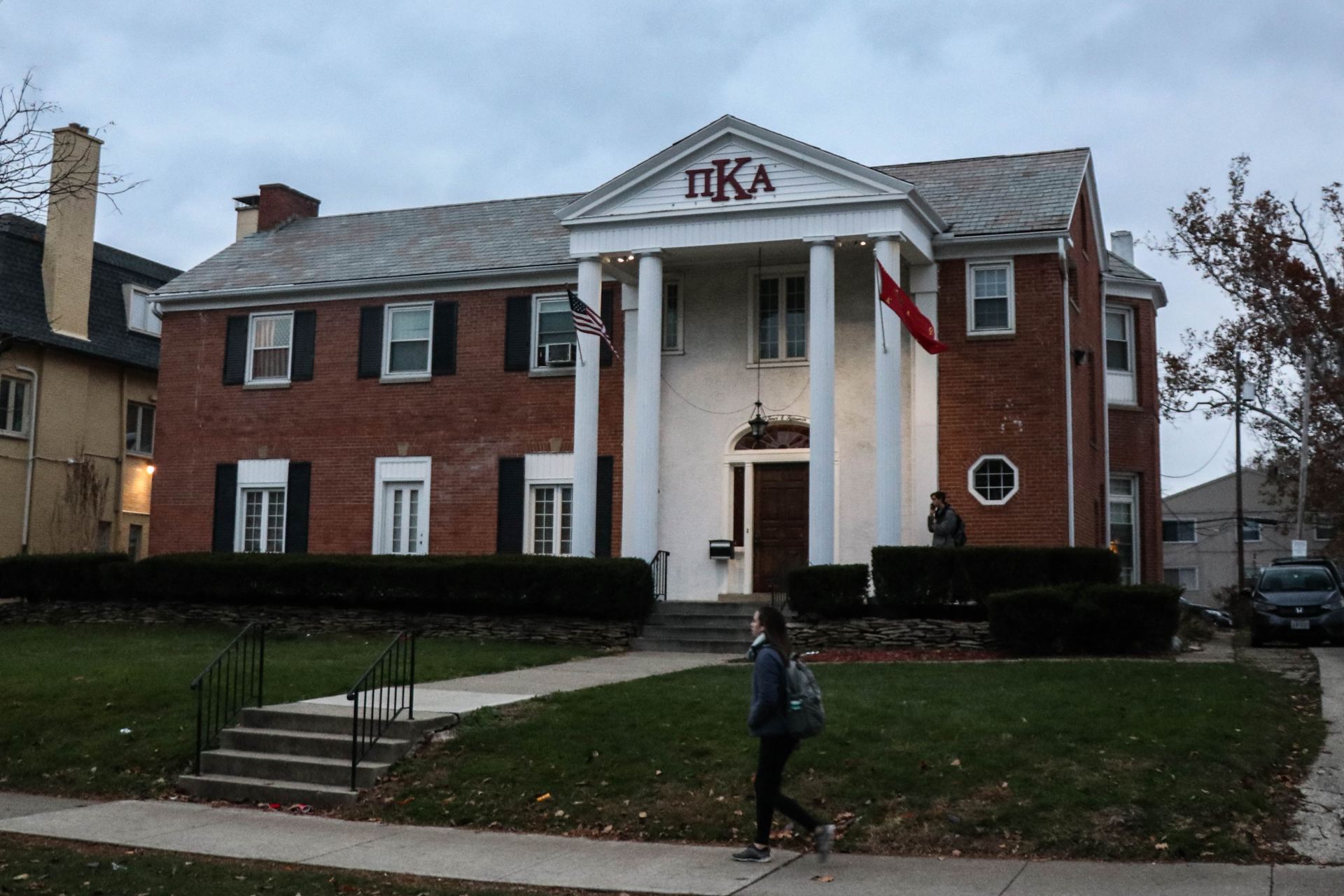
The Ohio State Pi Kappa Alpha Fraternity resigned its national charter after a university investigation led to the revocation of its student organization status. Credit: Jack Westerheide | Lantern File Photo
The Ohio State chapter of Pi Kappa Alpha fraternity, commonly known as Pike, resigned its national charter after an Ohio State investigation led to the revocation of its student organization status through August 2024, effective Wednesday.
Ryan Sheffield, a third-year in business and president of Ohio State’s Interfraternity Council, said Pike was under investigation for Code of Student Conduct violations following an event the fraternity held in October.
The national organization, which had already suspended the chapter Jan. 19 during the university’s investigation, accepted the chapter’s resignation, Sheffield said. In a letter to Ohio State’s Greek Life community Jan. 19, Justin Buck, Pike’s national executive vice president, said the former fraternity members are prohibited from forming an “underground” fraternity in their name and asked the community to discourage any such formation.
Related: A cycle of sanctions: How repeatedly disciplined fraternities stay on campus
Fraternities have been a part of Ohio State’s campus since the late 1800s, and in the more than 100 years since their establishment, nothing has ever caused the university to remove a frat from campus — not even death.
Pike was cited for violating alcohol rules, engaging in endangering behavior, failing to comply with university or civil authority, violating university rules or federal, state and local laws, and student conduct system abuse, according to Sorority and Fraternity Life disciplinary records.
“There were a lot of factors, some within our control, some not in our control,” Emerson Wieczorek, a third-year in nursing and president of Pike, said. He said the organization had no further comment.
According to the Code of Student Conduct, endangering behavior involves taking or threatening action that jeopardizes the safety, health or life of a person or causes fear of such action. The code defines violating alcohol policy as “use, underage intoxication, production, distribution, sale, or possession of alcohol in a manner prohibited under law or applicable university policy or facility policy.”
In June 2019, the fraternity was placed under disciplinary probation through May 2021 and was barred from having events with alcohol through December 2019 for violating the university’s alcohol rules, endangering behavior and failure to comply with previous student conduct sanctions, according to disciplinary records.
In August 2018, the organization was placed under disciplinary probation through May 2019 and was barred from hosting social events through September 2018 for violating university alcohol rules and endangering behavior, according to disciplinary records.
Two other Ohio State fraternities have been placed on interim suspension pending investigation.
Acacia and Alpha Tau Omega have been placed on interim suspension Jan. 22 for endangering behavior, failure to comply with university or civil authority and violating university rules, state, federal and local laws, according to the disciplinary records. Acacia has also been charged with student conduct system abuse.
While on interim suspension, the chapters will not be eligible to participate in any recognized student organization activities — including virtual activities — and must halt all new member activity, Kellie Uhrig, associate vice president and chief of staff in the Office of Student Life, said in an email.
The Ohio State Sorority and Fraternity Life disciplinary records begin March 7, 2017.
In December 2020, Acacia was placed on disciplinary probation through Dec. 18, 2021, and on restrictions on social activities for the remainder of the 2020-21 academic year for failure to comply with university or civil authority, violation of university rules, federal, state and local laws and alcohol, according to disciplinary records.
In February 2019, Alpha Tau Omega was barred from hosting social events with alcohol through March 31, 2019, and on disciplinary probation through May 3, 2020, for hazing, endangering behavior and violating alcohol rules, according to disciplinary records.
The Code of Student Conduct defines hazing as “doing, requiring or encouraging any act, whether or not the act is voluntarily agreed upon, in conjunction with initiation or continued membership or participation in any group, that causes or creates a substantial risk of causing mental or physical harm or humiliation.”
Sheffield said students still interested in joining a fraternity should consider other chapters or wait until next semester.
“The IFC encourages all students who are interested in what fraternity life has to offer to seek chapters and recruitment activities that are following university and IFC guidelines,” Sheffield said.
The Alpha Tau Omega and Acacia Ohio State and national chapters did not respond to requests for comment.
Owen Milnes contributed reporting.
Updated at 11:10 a.m., Thursday, Jan. 28: This article was updated to include the statement from Buck’s letter.
Correction: A previous version of this story stated the revocation of Pike’s student organization status was effective Tuesday, according to a university document. The document was inaccurate and the article has been updated to reflect the correct revocation day: Wednesday. The document also inaccurately listed Alpha Tau Omega as being suspended from September 2020 to December 2020 and inaccurately stated Acacia did not have a disciplinary history. This article has been updated to reflect those changes.


